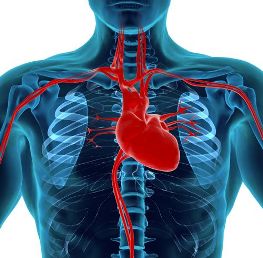Androgens Effect on the cardiovascular system
Sex hormones have an effect on the cardiovascular morbidity and mortality – which is considered largely accepted. While androgens (male sex hormones) are a risk factor for cardiovascular disease, the estrogens (female sex hormones) is rather ascribed a protective function. However, there are several epidemiological studies that contradict this view: in fact, most studies show namely of healthy men a positive correlation between endogenous plasma testosterone levels and HDL cholesterol and a negative correlation with LDL-cholesterol. This means that high endogenous testosterone levels associated with a lower risk factor for cardiovascular disease and lower testosterone levels with a higher risk. The more atherogenic lipid profile, which is diagnosed in men with low testosterone levels, could be caused by insulin resistance. This insulin resistance can turn to lower the plasma testosterone führen.Während low testosterone levels of increased biochemical risk factors for cardiovascular disease and myocardial infarction are accompanied, however, there seems to be no increased mortality risk to geben.Die administering physiological testosterone doses in healthy men with low testosterone levels usually results in to an improvement in insulin sensitivity, a decrease in total and LDL cholesterol and a decrease in visceral adipose tissue. However, this is used synonymous with decreased cardiovascular Risikos.Werden for

substitution non-aromatisierbare testosterone derivatives, a more atherogenic lipid profile developed. Also performs the administration of supraphysiological doses of androgens or synthetic anabolic steroids, which are often used by athletes or bodybuilders to a clearly atherogenic Lipidprofil.Bei women we come to quite different results: hyperandrogenic women, for example those with polycystic ovarian syndrome (PCOS) often develop insulin resistance, which in turn results in an increase in the secretion of androgens by the ovaries to the result. These women are at increased risk of getting cardiovascular disease. The importance of increased androgen levels per se for the insulin resistance is, however, controversial in women. Some studies have shown a causal relationship between elevated androgen in women and insulin resistance and other come to the conclusion that the insulin resistance is likely due to the preponderance of patients. The same controversy is geführt.Darüber, there are also about the relationship between elevated levels of testosterone and the atherogenic lipid profile of these women writers who report a normal lipid profile in normal weight women with polycystic ovary syndrome and others with a atherogenic lipid profile of lean women Polycystic Ovarian sprechen.Exogene androgens are administered exogenously women usually only in conjunction with estrogens. These androgens increase libido and lead to an increase in sexual activity. On the other hand, they inhibit the increase of HDL cholesterol, the on.The usually caused by the estrogens treatment with anabolic steroids such as nandrolone or stanozolol, leading to a clearly atherogenic Lipidprofil. Transsexual be for the conversion of female to male androgen treated to gain men typical testosterone levels. The patient then have a lipid profile, which is the “normal” Men comparable. This means it is atherogenic than Frauen. Übergewichtige women with PCOS have an increased risk of getting cardiovascular disease. It was calculated that these women carry a three times higher risk of myocardial infarction to suffer as a healthy Frauen.
We can therefore record the following points:
Men with a reduced endogenous testosterone levels are at increased risk of getting cardiovascular disease.
The administration of physiological doses of testosterone in patients with reduced endogenous testosterone levels leads to a reduction of cardiovascular risk.
Will non-aromatisierbare testosterone derivatives, excessive testosterone doses or synthetic anabolic steroids administered, there is a clearly atherogenic lipid profile.
In women, endogenous androgens exert no protective effect. They tend to lead to an atherogenic.
Lipid pattern: The scored by estrogens high HDL Spiegel is lowered by androgens.
Also exogenous androgens affect women negatively on the lipid pattern. This is atherogenic by administering androgens as well as in men.
Effects of testosterone on the vascular system are the subject of active research. We will have to see what this research will bring us in the near future.
Prof. Dr. med. Alex Vermeulen
Dept. of Endocrinology
University Hospital-Ghent
De Pintelaan 185
9000 Ghent
Belgium
I enjoy writing a newsworthy story, create interesting articles and hunt down experts for interviews which can be challenging for most freelance writers. Now add a visual impairment to those challenges and see what you get!